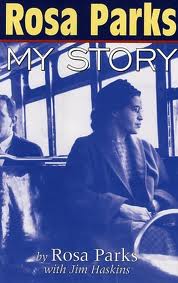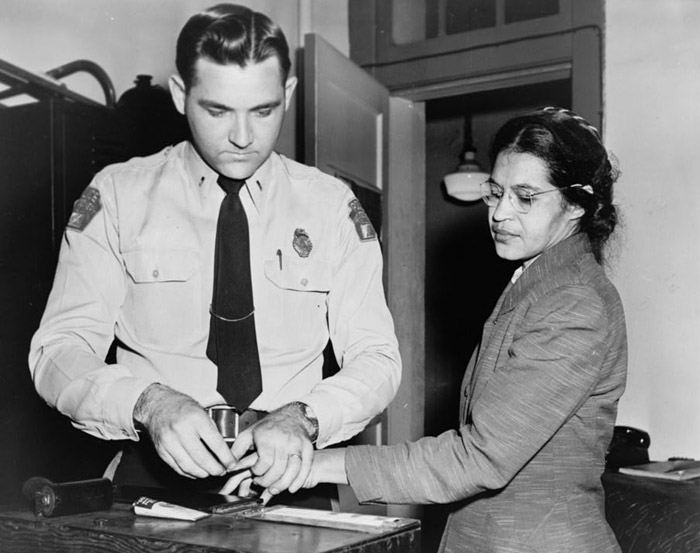Rosa Parks: My Story - Books - People & Culture
Rosa Parks: My Story (Puffin Books, 1992; 190 pages)
 Rosa Parks (1913-2005) was involved in the nonviolent struggle of the Civil Rights movement in the USA. Her arrest in 1955 following her refusal to give in her bus seat to a white person was key to challenge the segregation laws in the USA Supreme Court. In her autobiography you will learn about Rosa Parks's life and struggle and hopefully you will learn to notice how nonviolent struggle is organized -- how it depends on (nonviolent) people's involvement in direct action, fighting for good laws, working for getting organized and developing networks of communication and solidarity. Just relate it to the 15M if you are in Spain! Find things to learn and things shared!
Rosa Parks (1913-2005) was involved in the nonviolent struggle of the Civil Rights movement in the USA. Her arrest in 1955 following her refusal to give in her bus seat to a white person was key to challenge the segregation laws in the USA Supreme Court. In her autobiography you will learn about Rosa Parks's life and struggle and hopefully you will learn to notice how nonviolent struggle is organized -- how it depends on (nonviolent) people's involvement in direct action, fighting for good laws, working for getting organized and developing networks of communication and solidarity. Just relate it to the 15M if you are in Spain! Find things to learn and things shared!
I have worked on a few documents I'm sharing here in case they are of use to you:
 Excerpts from the Rosa Parks autobiography with intro by michelle for her students
Excerpts from the Rosa Parks autobiography with intro by michelle for her students- Glossaries:
 Glossary: Legal Terms in Context
Glossary: Legal Terms in Context Glossary: Language used in social/nonviolent struggle
Glossary: Language used in social/nonviolent struggle 
![]() Chapter 11, We Move to Detroit, and Chapter 12, The Years Since, include some information about Malcom X and Luther King in regards to violence and nonviolence and Rosa Parks's feelings about it. It is interesting to learn about her thoughts on this. But there is more: from my perspective today as a feminist pacifist, I can see how in spite of the fact that nonviolent direct action came naturally to people for practical/human/ethical/emotional reasons, as it generally has, especially among women (due to complex reasons, not biological precisely!), the connection with religious believes made later on by the very gifted speaker Martin Luther King involved people started equating -- and most people still do!! -- nonviolence to the spiritual, to something related to religious believes. Another interesting point to mull over is self-defense. When is self-defense violent? Anyway, for people interested in nonviolence, these two chapters can be good material for analysis.
Chapter 11, We Move to Detroit, and Chapter 12, The Years Since, include some information about Malcom X and Luther King in regards to violence and nonviolence and Rosa Parks's feelings about it. It is interesting to learn about her thoughts on this. But there is more: from my perspective today as a feminist pacifist, I can see how in spite of the fact that nonviolent direct action came naturally to people for practical/human/ethical/emotional reasons, as it generally has, especially among women (due to complex reasons, not biological precisely!), the connection with religious believes made later on by the very gifted speaker Martin Luther King involved people started equating -- and most people still do!! -- nonviolence to the spiritual, to something related to religious believes. Another interesting point to mull over is self-defense. When is self-defense violent? Anyway, for people interested in nonviolence, these two chapters can be good material for analysis.
Civil Rights icon Rosa Parks dies. 26 October, 2005 - More news items to listen to
Now listen to the audio
and fill in/out the gaps. The answers are below the picture of Rosa's arrest!
Source: http://www.bbc.co.uk/worldservice/learningenglish/newsenglish/witn/2005/10/051026_parks.shtml
This report from Laura Trevelyan:
Rosa Parks, whose refusal to give up her bus seat to a white man started the US civil rights movement in the mid 1950s, has died at the age of ninety-two. Her cause was supported by a little known Reverend, Martin Luther King Jnr.Rosa Lee Parks was forty-two years old when she ______1______ history. She was sitting on the bus in Montgomery, Alabama, one day in 1955 when a white man demanded her ______2______. Mrs Parks refused, defying the ______3______ which required blacks to give up their seats to whites. She was arrested and ______4______. Her treatment triggered a ______5______-day boycott of the bus system, organised by the Reverend Martin Luther King Junior. The Montgomery ______6______ boycott marked the birth of the civil rights movement. Seven years later, Rosa Parks ______7______ that momentous day:
ROSA LEE PARKS: "The driver said that if I refused to ______8______ the seat, he would have to call the police and I told him 'just call the police', which he did and when they ______9______, they placed me under arrest."
REPORTER: "Wasn't that a pretty frightening thing, to be ______10______ in Montgomery, Alabama?"
RLP: "No, I wasn't afraid at all."
R: "You weren't frightened, why weren't you frightened?"
RLP: "I don't know why I wasn't, but I didn't feel ______11______. I had decided that I would have to know once and for all ______12______ rights I had as a human being and a citizen, even in Montgomery, Alabama."Her public stance made her a symbol of the civil rights movement, but it also made it ______13______ for her to get work in Alabama. She and her husband, Raymond, ______14______ to Detroit, where she worked as an aide in a Democratic Congressman's office. Upon her retirement, Mrs Parks ______15______ her time to an institute she and her husband founded, aimed ______16______ developing leadership among young people. Rosa Parks will be remembered for the way her quiet determination in the face of injustice ______17______ change America.
Related information
Read an amazing story now, One Crazy Summer, by Rita Williams-Garcia

Answer Key to listening activity on Rosa Parks: 1. made 2. seat 3. rules 4. fined 5. 381 6. bus 7. recalled 8. leave 9. came 10. arrested 11. afraid 12. what 13. hard 14. moved 15. devoted 16. at 17. helped